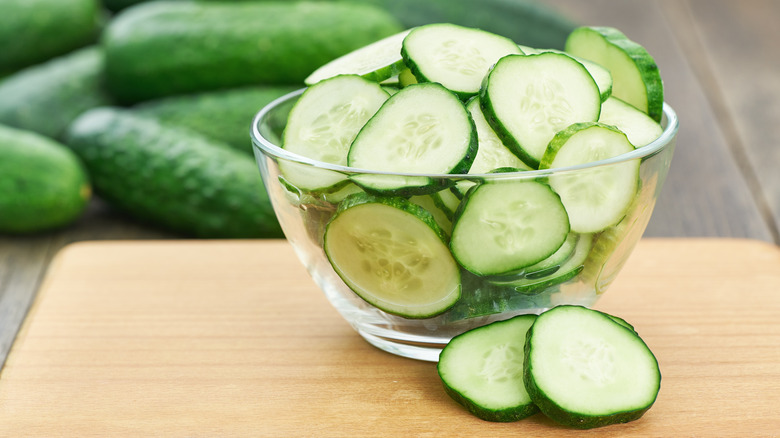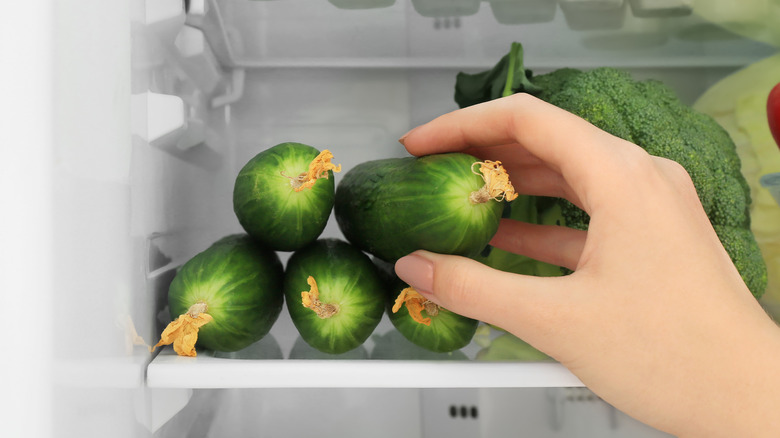The Simple Hack To Bring Weary Cucumbers Back To Life
Most of us have the best intentions when purchasing fresh produce. We aim to meal prep salads on Sunday to eat all week – full of fresh romaine, cherry tomatoes, and raw cucumbers. Yet often, reality sets in that we're more pressed for time than we realized. When the next Sunday rolls around and you remember you never used those (once fresh) cucumbers from last week, what's the solution? If you have a cucumber or two teetering on the edge between saving or throwing in the compost or wastebasket, you may want to try reviving those valuable green veggies before completely giving up.
Cucumbers actually have quite a long shelf life when kept intact. Whole cucumbers can last up to two weeks in the right environment, while sliced cucumbers only last a few days. If your older whole cucumbers are a little more bendable and soft than you'd like (and you can't remember exactly when you bought them) try cutting these not-so-crisp veggies into spears and submerging them in water. Doing so may actually restore their usual crunchy texture.
How to successfully revive forgotten cucumbers
Before you attempt to use your older cucumbers as the central component of your favorite cucumber salad, you may want to try reviving these veggies to see what a little water can do. In August 2022, the food waste organization Too Good To Go posted an Instagram reel detailing how to revive old cucumbers with only a jar and some water.
The process is fairly simple. Take your cucumbers and slice them into pickle-like spears, pack them tightly in a jar, and add water until the spears are completely covered. Once refrigerated, in as little as 12 hours, you may notice that your cucumbers have redeveloped their signature bite. Keep in mind, however, that traditional, thick-skinned cucumbers are more easily revived with this method than those with thinner outside skins like some English varieties.
Since cucumbers are composed of over 90% water, osmosis causes their inner cells to retain moisture, creating what is scientifically categorized as turgor pressure. When cucumbers contain adequate moisture, their water-filled cells push against their outside skin, keeping them crisp and firm. Now that you know a lack of moisture may be the root cause of your cucumber problems, what are some ways you can protect your next batch of cucumbers from moisture loss?
The right way to store cucumbers
In order to safeguard your cucumbers from the start, where you store them in your refrigerator matters. Keep whole cucumbers toward the front of your fridge — or in the crisper drawer where there's higher humidity. When cukes are stored below 50 degrees Fahrenheit, cold temperature deterioration is more likely. If you're still worried you won't be able to use up your cucumbers within a week, there are a few ways you can store them to increase their longevity.
Moisture loss is a big factor in cucumber degradation so assuring your cucumbers stay hydrated without the added risk of condensation is key. As it turns out, plastic wrap is the key to longer-lasting cucumbers since that thin layer of plastic locks in moisture. Whole cucumbers wrapped in paper towels and stored in a sealed plastic bag is another resourceful method that can keep your cucumbers fresh — and for English and Persian cucumbers this method can extend crip freshness up to three weeks.
Storing cucumbers without that added layer of protection is not a deal breaker, but if you want your vegetables to stay crisp for a longer period of time, you may want to use one of these suggested methods to seal in moisture. While this information may help you next time, if your current cucumbers are looking a bit droopy, try breathing some new life into your old produce with a few jars and a healthy dose of water.


